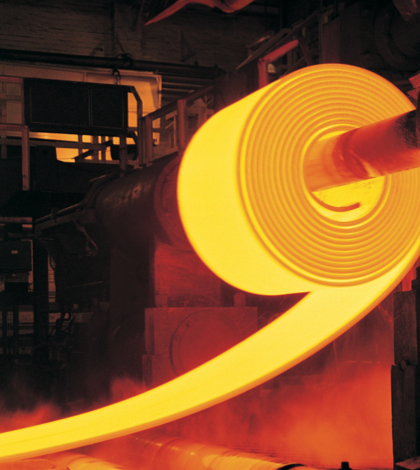For the first time since March, the Inland Empire’s purchasing managers index drops below 50. While it’s too early to call it a trend, some people are more anxious than normal to see the next set of data.
After five months of growth, manufacturing in the Inland Empire shrank during September.
Time for concern?
No, says Barbara Sirotnik, director of the Institute of Applied Research and Policy Analysis at Cal State San Bernardino, which publishes the purchasing managers index for the Inland Empire.
While the index was 48 last month – two points below the baseline of 50 that determines whether the region’s manufacturing sector is expanding or contracting – it takes three straight months, positive or negative, to establish a trend. No one should push the panic button after one slightly down month.
But that doesn’t mean Sirotnik, who puts together the monthly report with the help of several student assistants, isn’t already a little anxious to see October index, which won’t be released until Nov. 3.
Five months of growth was a sign that manufacturing, like the Inland housing market, really was coming back and possibly returning to its pre-recession levels. Now, at least for a moment, there’s reason to wonder, although Sirotnik said the index had crept so close to 50 – it was 50.9 in August, which would qualify as slow growth – that she almost expected the number to dip below 50 at least once before the end of the year.
“If it’s down next month, then I’ll be concerned, but for now there’s no trend in either direction,” Sirotnik said. “What we’re seeing now is a lot of volatility in the report, a lot of numbers up and down during the past few years. I hate to say wait-and-see, but that’s where we are.”
The Inland index looks shaky when put up against the national purchasing managers index for September, which was released Oct. 1 by the Institute for Supply Management in Tempe, AZ.
The national index was 56 percent, while the new orders index was 60 percent: both of those numbers were down compared with August, but both sectors were still growing, and national manufacturing expanded for the 16th consecutive month.
Locally, September has been particularly inconsistent during the past few years: 53.4 in 2010, followed by 47.8 in 2011, down to 43.6 in 2012 but back up to 53 last year, the same time the economy started showing genuine signs of recovery.
“September is generally a mixed month,” Sirotnik said. “There’s not a lot of seasonality to it one way or the other.”
Sirotnik believes that volatility, especially recently, might be being caused by national and international factors, like the slow recovery of the U.S. economy, uncertainty regarding the upcoming midterms elections and the ongoing turmoil in the Middle East.
“But I don’t see anything in the numbers that causes me to say that manufacturing in the Inland Empire is dropping,” Sirotnik said. “Obviously, that’s a good thing.”
The San Bernardino County Economic Development Agency co-sponsors the index, and officials there watch it closely, said Mary Jane Olhasso, the county’s assistant executive officer of finance and administration.
“It does seem like the numbers have some wobble to them,” Olhasso said. “I’m not concerned yet, and I definitely want to see another month, but it’s obvious that the numbers are volatile. World events might be some of the reason for that.”
Olhasso, who said she expects the index to fluctuate during the last three months of the year, said she doubts that the mid-term elections next month and the prospect of a Republican takeover of the Senate are having much impact on manufacturing.
“Presidential elections can influence things, but I don’t think the mid-terms have much effect,” Olhasso said. “It’s a lot more likely that the problems in the Middle East are slowing things down. The question is how long that will last.”
Bud Weisbart, marketing director at AR Tech in Fontana, describes himself as “an optimist with reservations” regarding the index, even when the number is below 50 or otherwise not encouraging.
“I didn’t like the number last month,” said Weisbart, whose company manufactures fabric products for the aerospace and other technical industries. “There’s a lot of uncertainty right now, people don’t know what direction the country is headed in, and there’s a lot of divisiveness at the national level. I think that’s what’s causing the problem, even locally.”
Weisbart, whose company is one of about 60 manufacturing businesses in the Inland Empire that receives an index questionnaire from the institute every month, said he believes the Inland region’s manufacturing sector is headed in the right direction.
“Things have gone well since September of last year, so I feel fairly positive about it,” Weisbart said. “In our case, we’ve built up a lot of backlog during the past couple of years, and now it’s starting to move out the door. I think we’re going to be OK for the rest of the year.”
Most of that backlog is in aerospace, where AR Tech – which started in Los Angeles in 1976 before it moved to Fontana in 1990 – does about 80 percent of its business.
“I think most of the aerospace industry is in the same place we’re in,” Weisbart said.
The institute began publishing the Inland index in 1993, after some local economists complained about not having an accurate measure of local manufacturing. It’s been published continuously since then, with only two brief interruptions, on the first work day of each month.
About 60 surveys are mailed out every month to businesses in both counties, and usually between 35 to 40 of those provide responses. Purchasing managers are asked a number of questions, including their overall rate of production, number of new orders and deliveries and whether they plan to hire or let go any employees.
They’re also asked whether they expect the economy to get better, worse or stay the same during the next three months. In the September survey, only 18 percent said they expect the economy to improve between now and the end of the year.
“Lately, [the purchasing managers] have been a pretty pessimistic bunch,” Sirotnik said.
 IE Business Daily Business news for the Inland Empire.
IE Business Daily Business news for the Inland Empire.


